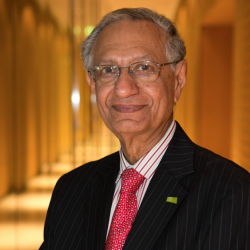The following article was written by Academy Fellow Ravi Chaudhry and originally posted on LinkedIn on August 11, 2020.
Jonas Salk, the discoverer of polio vaccine, used to say that “What people think of as the moment of discovery is really the discovery of the question.” Confined within homes or working with limited social contact and mobility, the leaders in governments and business are frantically busy trying to find answers to the avalanche of questions arising all the time. I wonder if we should spend as much time, if not more, on framing the right questions, first.
It is not unusual for successful and wealthy people to believe they know the answers to all the questions of life. The unacknowledged tragedy is that all the questions have been changed. The human race, individually and collectively, has never felt as vulnerable as now. Within a few months, humankind has experienced a scale and severity of transformational change that normally happens over several generations. Nothing, without exception, will ever be the same again.
What are the top-of-the-mind questions doing the rounds? If you ask the three and a half billion commoners, over half the world’s population, with no jobs, no income, zero wealth and uncertain prospects, you discern a palpable sense of resignation. Their frustration is fraught with simmering anger, “Why us again? Why us every time? Is poverty our eternal destiny?”
If you ask small business entrepreneurs, and owners of service sector industries (including large corporations) that account for sixty to eighty percent of employment in a nation, they wonder, “If humans don’t want to meet other humans, how can demand revive and how shall we survive?”
If you query big businessmen, they are concerned about, “How to cut costs while we digitize person-to-person interactions, automate the processes and discover a new relevant business model, employing as few people as possible?”
As regards political leaders, you don’t have to inquire, heads of authoritarian regimes as well as many so-called democracies are using the opportunity to strengthen their surveillance and hegemony, and deepen the ‘deficit of democracy’.
If you engage with futurists and thinkers, they assert that COVID-19 is not the sole adversary. We may control it one day, but another equally fierce adversary could envelop us anytime. This will continue till we recognize that the pandemics, typhoons, tsunamis, and the acts of terrorism are not black swan events – but more a consequence of our collective transgressions. To chart the way forward, “The G20 leaders must immediately and collectively address the seven big challenges the planet faces today: climate change, ecosystem collapse, inequality, nuclear menace, financial exclusion, epidemics, and technology’s monopolistic trajectory. Denial of even one of these is equivalent to a virtual global suicide pact. This is no time to wait and see. It is time to do or die.”
Political analysts remind us that human history is an unremitting saga of discords and accords among nation states. At this juncture in the 21st century, when the existing multilateral institutions including the United Nations are virtually moribund, and when the strong winds of nationalism, protectionism, and my-country-first-ism, are blowing across all continents, one encounters more discord among nations than at any time since the Second World War. “How do we make G-20 leaders accept in unison that no country or region can hereafter be an island of seclusion; we will either all grow, or we will all perish?” The entire planet belongs to us; territorial ambitions or military actions may create a façade of transient superiority, but everybody loses. It is still within our capabilities to reverse the course, and create a new charter to usher in a safe new world, a “United Planet of Nations”. The potential upside for both the leaders and the masses is enormous.
Klaus Schwab and Thierry Malleret, in their recent book, “COVID-19: The Great Reset”, make a compelling case that this indeed is the time to start pursuing a “path that will take us to a better world: more inclusive, more equitable, and more respectful of Mother Nature,” but leaving no doubt that this would be possible only if the business community makes the right moral choices and enthusiastically makes the transition to stakeholder capitalism. Hazel Henderson of Ethical Markets and Rinaldo Brutoco of World Business Academy have been relentlessly emphasizing this for many years.
The importance of the role of the corporation is irrefutably perceived as a major component in this transition. To shift from ‘shareholder primacy’ to ‘planetary primacy”, an offside, part-time ‘corporate social responsibility’ (CSR) must give way to the emergence of ‘socially responsible corporations’ (SRC) – a tangible shift from CSR to SRC, marking the beginning of a new era of “responsible entrepreneurship”.
Today – when political initiatives appear to be a non-starter, conscious corporate leaders across countries can alone take the lead to coalesce and sift all the questions raised above and steer the process of global transformation, by first transforming themselves. The global unity we see, including at corporate level, in “I can’t breathe” movement is an unassailable confirmation of the new big wave of togetherness, comprising people who are looking inwards in their renewed quest for values and wisdom.
Meanwhile, let us keep questioning the questions, till such time as the questions themselves provide the clear pointers to the path ahead.
Ravi Chaudhry (www.ravichaudhry.com) is an advisor to CEOs, Corporate Boards, and governments, on revamping strategy, discovering latent strengths, and building a new edifice of leadership to cope with future. His book, Quest for Exceptional Leadership: Mirage to Reality has been globally acclaimed as “the best book on leadership in years and a rare combination of sound business thinking and accessible philosophy.” A Fellow of World Business Academy, and Co-Chair, EthicMark® Judges Panel USA; he was earlier Chairman/CEO of Tata Group companies in India.
This piece is a part of the new book he is presently writing on issues relating to “Reinventing Democracy”.

